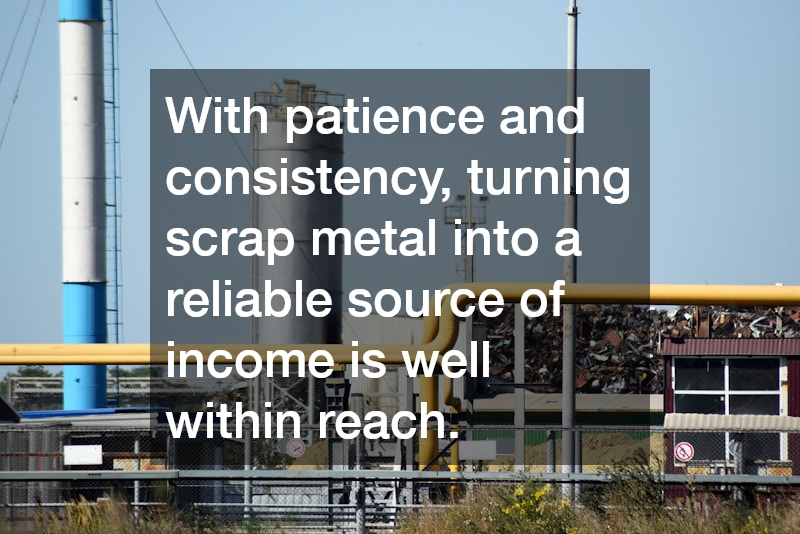Recycling scrap metal can be a rewarding way to earn extra money while helping the environment. Many people overlook the potential value hidden in old appliances, car parts or construction debris. Whether you are a beginner or looking to improve your current strategy, understanding how to get the best return on scrap metal is essential.
This guide will show you practical tips to maximise your earnings efficiently and safely.
Understand the Value of Different Metals
Not all metals are created equal. Some are far more valuable and in demand than others. Common valuable metals include copper, aluminium, brass and stainless steel. Ferrous metals like iron and steel are generally less valuable but often come in larger quantities, so they still add up.
Learning how to identify different types of metals can significantly improve your profits. Copper, for example, is highly sought after in the recycling industry due to its electrical conductivity and durability. Old wiring, pipes and even some fixtures can contain copper. Aluminium is lighter and often found in cans, window frames and some vehicle parts.
Take the time to educate yourself about the metals you encounter. A simple magnet test can help distinguish ferrous metals, which stick to magnets, from non-ferrous metals, which do not. This is important because non-ferrous metals usually fetch higher prices.
Sort & Prepare Materials Correctly
One of the simplest ways to increase the amount you earn is by sorting materials carefully before selling them. Mixed metal loads typically attract lower prices because recycling centres have to spend time separating the materials themselves. By sorting metals into separate categories like copper, aluminium, steel and brass, you make the job easier and add value to your haul.
Cleaning the metal also helps. Removing non-metal attachments such as plastic, rubber or wood will increase the weight of pure metal you deliver. This can make a noticeable difference in price since metal is usually paid by weight.
Avoid damaging the metal as much as possible. Bent or crushed pieces can sometimes be less desirable. If you have large or bulky items, try to break them down into smaller pieces to help with transport and sorting.
Know the Market Prices & Sell Smart
Prices can fluctuate due to supply and demand, global market trends and even seasonal factors. Keeping track of current prices helps you decide when and where to sell. There are many online resources and local yards that publish updated rates.
It is wise to check several buyers in your area. Prices and payment terms can vary between yards. Some offer better rates for certain metals or larger quantities. Establishing a relationship with a trusted buyer can also lead to better deals over time.
Consider the timing of your sales. When demand is high, such as during construction booms or after natural disasters, prices tend to rise. Holding onto your metal until prices improve can boost your earnings, provided you have a safe place to store it.
Utilise Tools & Equipment to Increase Efficiency
If you plan to collect regularly or in large quantities, investing in some basic tools can make your process faster and safer. Tools such as bolt cutters, wire strippers and hammers help you dismantle items and separate metals more easily.
Safety equipment like gloves, goggles and sturdy footwear is essential to avoid injuries. Yards and recycling centres usually have strict safety policies, and protecting yourself will allow you to work efficiently without setbacks.
For those with bigger volumes, a vehicle like a trailer or ute can save time and trips. Efficient transport means you can gather more material and deliver it in one go, saving money on fuel and effort.
Explore Local Recycling Programs & Incentives
Many councils and community groups run recycling initiatives that offer additional incentives or services. Some areas provide collection days or subsidised drop-off points. These programs not only make recycling easier but sometimes offer bonuses or rebates to encourage participation.
Researching local programs can uncover new opportunities to increase your earnings. You might find a scheme that pays for specific types of metal or offers better prices to residents. Some councils even offer free advice on how to prepare your metals for sale.
Stay Safe & Legal While Handling Materials
Working with metal requires caution and adherence to regulations. Always ensure the materials you collect are legally obtained. Avoid taking metals from private properties or construction sites without permission.
Wear appropriate protective gear to avoid cuts, scrapes and exposure to hazardous materials. Metal can sometimes contain sharp edges, rust or chemical residues. Being careful prevents costly injuries and delays.
Before transporting materials, check local laws about weight limits and required permits. Some metals may need special handling due to environmental regulations. Knowing these details upfront helps you avoid fines and keeps your business running smoothly.
Maximising your earnings involves knowledge, preparation and smart decision-making. By understanding metal types and values, sorting and cleaning your materials, keeping an eye on market prices and investing in the right tools, you can increase your profits considerably. Taking advantage of local recycling programs and maintaining safety and legality ensures your efforts are sustainable and stress-free.
With patience and consistency, turning scrap metal into a reliable source of income is well within reach. Start today by assessing what metal you have around you and applying these tips to get the best possible return.
.

